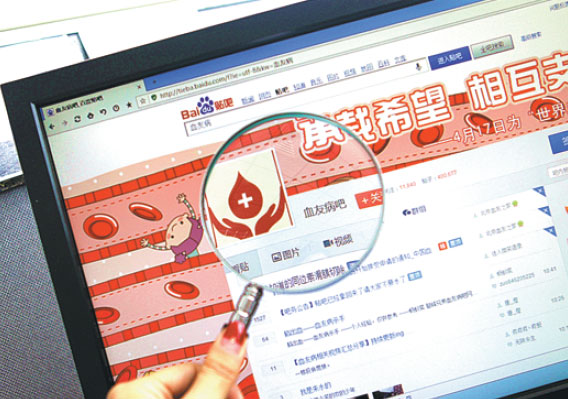
A webpage of the hemophilia forum on Baidu Tieba, an online community-based platform operated by Baidu, a leading Chinese Internet search engine. Guan Xin / China Daily
Unregulated content
According to Mao, the commission, China's top health authority, used to encourage disease-specific NGOs to actively cooperate with Baidu to correct misunderstandings and remove inappropriate information about a range of illnesses on Tieba forums.
The collaborations were one-time ventures, but Mao has urged regular consultations between NGOs and information providers. He said Baidu is an excellent tool and could still serve as an online platform for health and disease information, providing the content is checked before being posted.
Physicians have also expressed concerns about largely unregulated online health content.
"It seriously affects our clinical work," said Zhang Zhichao, a leading specialist in andrology (diseases specific to men) at Peking University First Hospital.
"Some patients have even asked me to perform certain tests they learned about on the Internet," he said.
A midwife at a well-known public hospital in Beijing said patients have used information garnered online to challenge diagnoses and medical interventions.
"However, most of the time they only got part of the truth (from the Internet)," said the midwife, who preferred not to be named because of the sensitive nature of her work.
She recalled one pregnant woman who suspected she had prostate cancer because she had noticed small amounts of blood in her urine.
"She learned about that on Baidu - unfortunately the information ignored the fact that woman don't have prostate glands," she said, adding that medical professionals are now spending an increasing amount of time dealing with the impact of inaccurate information online.
Poor health awareness
Surveys conducted by the National Health and Family Planning Commission show that many people have low awareness of illness and health issues. According to Song Jun, deputy director of the commission's Health Education Center, the latest survey, undertaken in 2014, found that more than 90 percent of Chinese lack awareness of health-related issues, and are unable to distinguish accurate information from falsehood.
Moreover, the supply of quality medical resources is unable to meet the ever-rising demand of an ageing society such as China, he said.
Statistics published by the commission show that the number of medical institutions rose by 1.5 percent every year from 2004 to 2013, while hospital attendance figures registered a 7 percent annual increase over the same period.
Liu Yuewu, a leading thyroid cancer specialist at Peking Union Medical College Hospital, said he sees more than 50 patients on average every day, many of them from outside of Beijing. "Even with that work rate, I still can't meet the demand," he said.
According to Liu, the hospital performs more than 1,100 thyroid surgeries on average every year, a huge jump from 1986, when there were just 10 cases.
The shortfall between supply and demand was illustrated by the case of a 40-something woman surnamed Su, who said she spent two weeks living in a cheap hotel room measuring just 8 square meters while she waited for a hospital bed.
In late January, Su travelled from her hometown in the northeastern province of Liaoning to consult Liu, who diagnosed thyroid cancer. "I missed the Spring Festival family reunion back home because I had to stay here waiting for a bed to have surgery," she said.
In addition to the growing demand, underperforming hospitals and medical professionals are placing even greater strain on the limited resources and threatening the quality of service.
"Every month we receive patients whose previous surgeries have failed," Liu said.
Song said limited access to quality medical resources is one of the reasons people have become so reliant on online medical advice forums, but he stressed that the Internet can still play a useful role in health education and information exchange.
"It's effective and convenient as a health communication tool, but the content needs to be strictly regulated," he said.


















































